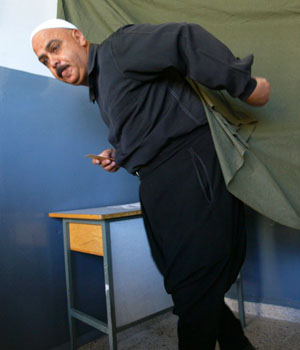
A Lebanese Druze voter exits a polling booth (R)
ALEY, Lebanon (Reuters) – Anti-Syrian rivals battled it out at the ballot boxes on Sunday as voters crowded polling stations to vote in the most crucial round of Lebanon”s parliamentary elections.
The most heated contests involved Christian leader Michel Aoun and his allies against a coalition headed by Druze leader Walid Jumblatt in the central Baabda-Aley constituency and against a Christian alliance in the Byblos-Kesrwan district.
A total of 1.25 million people are eligible to vote in the Mount Lebanon and eastern Bekaa Valley regions in the penultimate stage of Lebanon”s first national election without the presence of Syrian troops for three decades.
But international concern over alleged Syrian intelligence activity in Lebanon has cast a shadow over the poll.
U.N. Secretary-General Kofi Annan decided last week to send a verification team back to Lebanon to check charges that Syrian intelligence agents were still in the country. An envoy — Terje Roed-Larsen — met Syrian President Bashar al-Assad on Sunday.
A U.N. spokesman said Roed-Larsen headed straight back to New York to brief Annan on the talks. He gave no further details.
The United States says it has information about a Syrian hit list targeting Lebanese leaders. Syria denies the charge.
With 58 seats up for grabs, the shape of the next 128-member parliament should become clearer after Sunday”s vote. Forty-two legislators were elected in the first two rounds of voting in Beirut and the south.
Those rounds caused no surprises. The son of assassinated former Prime Minister Rafik al-Hariri won by a landslide in the mainly Sunni capital and a joint Hizbollah and Amal list of candidates triumphed in the southern Shi”ite heartland.
Four hours after the start of voting turnout in Mount Lebanon was 18 percent and in the Bekaa 13 percent, the Interior Ministry said.
Old women in traditional Druze dresses were carried to polling stations while old men were helped up stairs to vote as election fever swept a swathe of picturesque mountain villages.
Many voters in the mainly Druze town of Aley, 16 km (10 miles) east of Beirut, said they voted for a Jumblatt-backed slate grouping Druze and Christian groups who battled each other during Lebanon”s 1975-1990 civil war.
"These alliances should happen so that we can forget the past. This is the only way to get over the war," Nada Najed, a housewife, said.
Anti-Syrian factions are set to win a majority in parliament but groups allied to Damascus, such as Hizbollah guerrillas, are expected to have substantial representation.
The new parliament is set to decide the fate of pro-Syrian President Emile Lahoud, address the disarming of Hizbollah, reshape ties with Syria and endorse a new election law.
Several opposition leaders have called for ousting Lahoud, blaming him for a role in Hariri”s killing, but the president has remained defiant.
"I am staying until the last moment in my tenure and this is because I believe that the constitution says so," Lahoud told reporters after casting a ballot. "We did as much as possible to stop corruption but there are so many corrupt people in … politics so I voted for the people who will stop corruption."
Aoun, a former general, has fallen out with other anti-Syrian leaders since returning to Lebanon in May from 14 years of exile.
He has criticised his rivals as "traditionalists", saying they benefited from Syria”s role in Lebanon after the end of the civil war and had turned against Damascus only in recent months. Aoun says he is a reformer and has vowed to fight corruption.
Anti-Syrian factions have been able to capitalise on a wave of sympathy over Hariri”s killing. His murder sparked big street protests that forced Syria to bow to international pressure to end a 29-year military presence in Lebanon in April.
Jumblatt and a top aide won in the Shouf district where their seats were uncontested. The Druze leader has allied himself with the Christian Lebanese Forces group, a civil war foe.

Lebanese opposition Druze leader Walid Jumblatt walks out of a polling station (R)

A Lebanese woman casts a vote as she holds her child (R)
